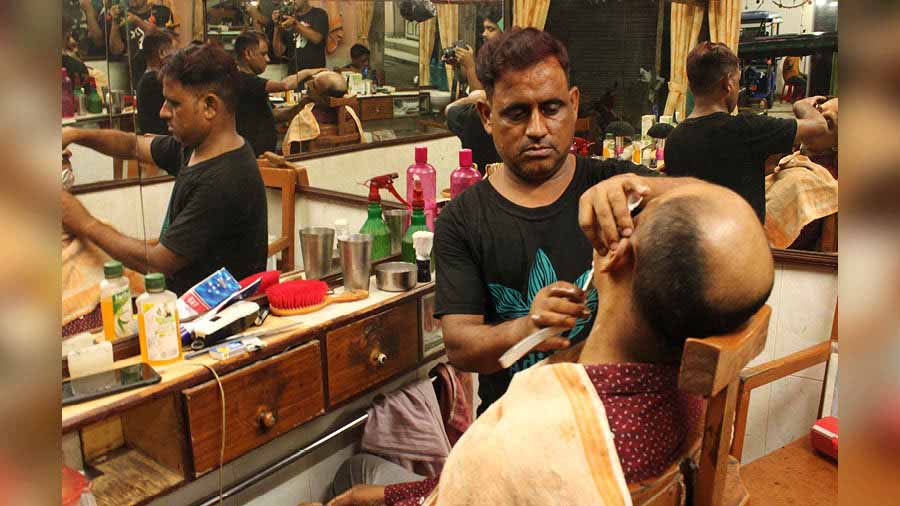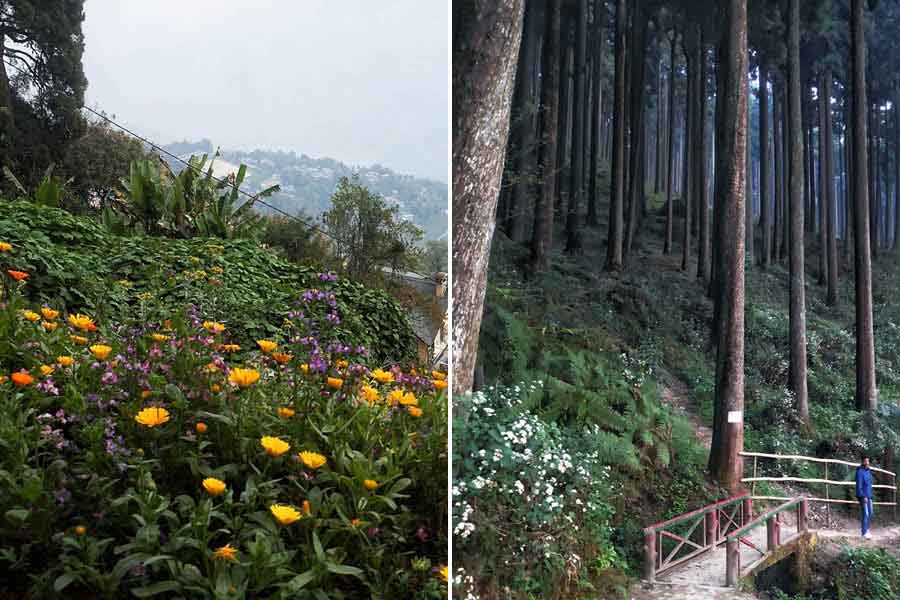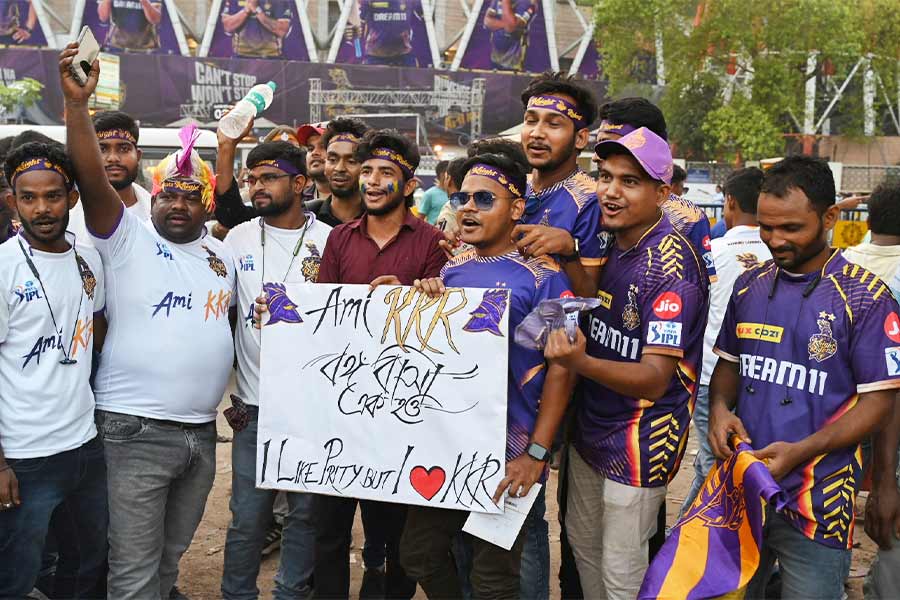It happened somewhere along the way. Exactly when, it’s difficult to pinpoint, but surely between individual growing up and the collective embrace of turn-of-the-century modernity. When the humble, no-frills saloon ceded ground to the attraction of fashionable salons.
Enter then, the salon, orthographically correct and with the promise of a new, indulgent world of enhanced beauty. Far from the old-world flavour of largely rough-hewn haircuts that the saloon invariably offered. But it is to these saloons that we’ll retrace our steps — with the extra ‘o’ firmly in place. To hell with spelling; this is about a part of our childhood.
The wobbly wooden chairs still rock in pockets, but mostly squeak, across Kolkata and towns nearby. For instance, Chandernagore, less than two-hours drive from Kolkata, where I have grown up, toes the line in between.
While urban spaces have new swanky salons springing up every passing week, saloons continue to thrive in pockets they rightfully claim, with their monotonous snip sounds fusing with faint Kumar Sanu numbers floating in from a radio perched atop a shelf. I’ve spent a number of heartbreaking hours at such saloons, growing up under the stern eyes of my ever vigilant father and, more remarkably, surviving the barber’s unwavering obedience to his staple instructions.
“Ekdom chhoto korey (cut his hair short),” my father would say, and the barber would smile — if one can call that a smile.
Fast forward a few years and, if anyone were to ask me, I wouldn’t be able to recall the last time I walked out with a haircut that would spoil my mood for days. The new salons listen to you. But to be fair, even the saloons do; you just needed the age to make your point.
Sensory delight
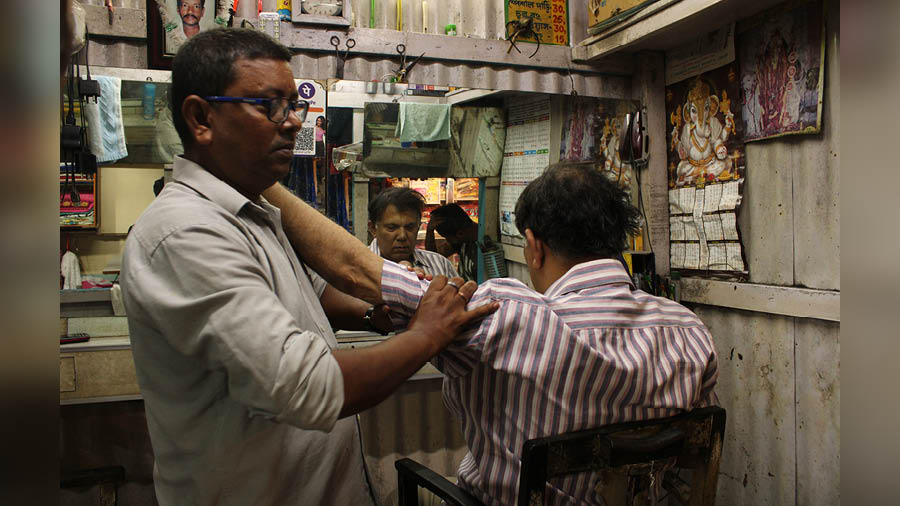
A customer gets a massage
Just like a household kitchen, these saloons would offer a sense of assurance and comfort, provided you were old enough to dictate what the barber did. The space has always been unapologetically masculine, with a recognisable and relaxing hum and chatter. Pampered and taken care of, men would let loose, in thought and in words — shirts unbuttoned, eyes half-closed or engaging in lazy banter on cricket, football, politics, surging school fees or dropping interest rates.
The Indian saloon is also a sensory delight. Packed with sounds — of the usual snip-snap, the swoosh of sprayers, buzz of clippers, the scrape of razors and the clap of palms before the anticipated massage down the shoulder and spine — it greets customers with a unique concoction of different aromas, too. Of shaving gel, sweat, aftershave and cigarette smoke. The sensory imprints have been strong. Not to mention, I have always wondered if the phitkiri (alum) would taste like a larger michhri (rock sugar).
It has been years since the time I would be forced to tag along with my father for a haircut on a weekend. To be deprived of the usual Sunday morning cricket, just to watch the precious hair being shortened, with teary eyes, is probably a very relatable memory. So, with just a couple of weeks to go until the Pujas, I decided to refresh that memory and visit these saloons in Chandernagore, which once teased to intrigue a pre-adolescent boy.
Fading art of the scissors
Mohan’s Saloon used to be the busiest spot on weekends, with queues that spilled onto the main street. Nobody could replicate an Amitabh Bachchan hairdo better than Mohan da, as I’ve heard from my father. A Filter Wills lodged firmly between his lips, Mohan da, with his signature scissors, made sure none of his khodders (customers) left without a smile. Now, the place is unrecognisably quiet, bereft of any music.
Mohan da’s son, Samaresh, who has been working here since 1993, was completing a massage session when My Kolkata caught up with him.
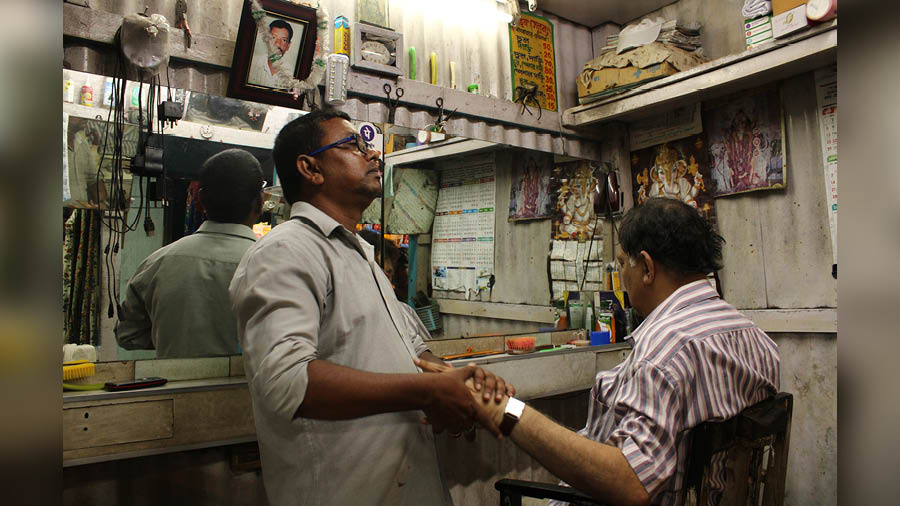
Samaresh Das has been coming to the saloon since 1993 and now owns the space
“People don’t prefer humble saloons like ours any more. A few old customers still come, along with a few young people here and there, but the footfall is falling steadily. This is the age of fancy trimmers; the art of our scissors is fading,” Samaresh says.
“My father is no more, and things haven’t been looking up for us. Earlier, before the Pujas, we would find it difficult to manage the time and the queue outside. Now, business has fallen by as much as 60 percent of what it was. We barely earn enough to meet our needs. All the talk is about fancy, air-conditioned salons that have become identified with status. Money has replaced trust.”
Samaresh doesn’t fundamentally oppose the modernisation. “Things get replaced, that’s how it has always been, but for those directly impacted, it’s a testing time.”
Pandemic effect
Just around the corner from Mohan’s Saloon, stands Chitra Saloon, one of the oldest in Chandernagore. The walls and the shelves always had a distinctive, old-fashioned touch, but everything about the space now felt different. “The saloon has been here for around eighty years. My father started it and I have been here since 1977. We were sensing the change, but it felt a lot more real and sharp during the Covid-19 days. Things aren’t good for us, quite honestly. Ten or fifteen years back, a week before the Pujas, we didn’t even get time to eat, our schedule- completely packed for ten to twelve hours. Today, even the weekends are not good days for the saloon any more. This generation prefers the salon,” says Chandan Deb Sharma, who runs a quiet Chitra Saloon now.
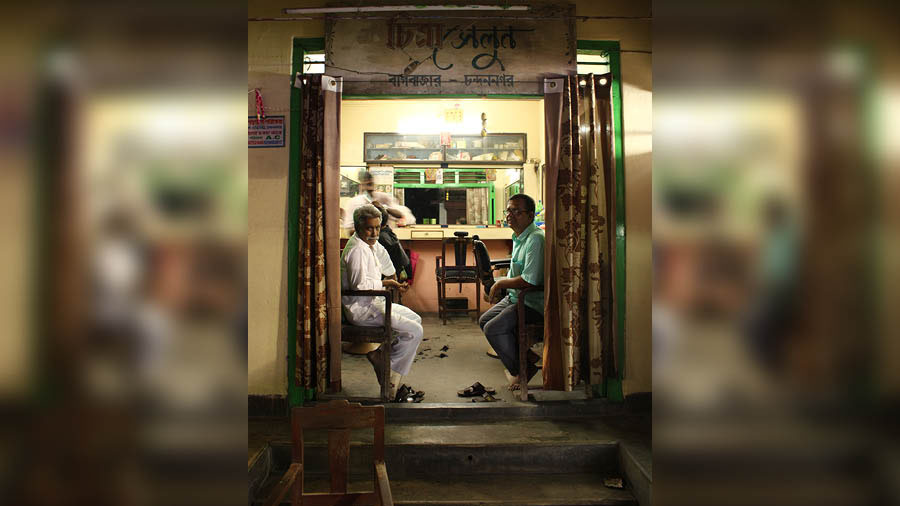
Chitra Saloon has been around for eight decades
Harinder Thakur, who has been working at Chitra Saloon for eighteen years, agrees that business was already bad before the pandemic changed everything. In two decades, he says, he has seen a flourishing place brimming with customers transform into one with occasional visitors and a handful of regulars.
A regular visitor, who has been coming to Chitra Saloon for the past thirty years, had been following the conversation, his chin tucked firmly in as Harinder snipped away with a practised hand. Haircut over, he too joined the conversation. “Change is the only constant. All businesses are going through an essential transformation. He (Chandan) doesn’t have the means to modify or keep up with the change, and that’s sad. But that’s the reality.”
Hardly honey-tongued, the elderly customer had hit the nail on the head. This is the age of modern salons; if the traditional saloons don’t have the resources to keep up and adapt, there’s nothing much they can do.
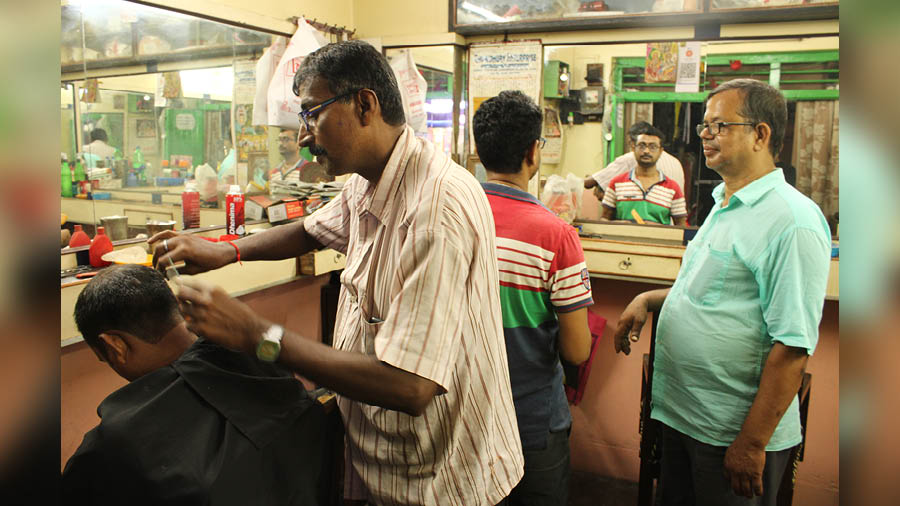
Harinder Thakur (left) and Chandan Deb Sharma (right) have seen the Chitra Saloon transform from a bustling pocket to a silent space
All changed, but pragmatic
The one element that seemed to connect these saloons was their deafening silence. Perhaps it stung more, because their sights and their sounds are so deeply nestled in my memory. Jawahar and Ramesh’s Saloon, which stands on a platform, on GT Road, was once notorious for the number of vehicles parked outside, which would often disrupt traffic. A man, his hair half-trimmed, running out to move his motorbike was a familiar sight.
The once vibrant blue walls are peeling apart with cobwebs and damp spots. Jawahar Thakur, who inherited from his father a roadside chair before transforming that modest legacy into a proper barbershop, doesn’t usually work any more. He doesn’t trust his quivering hands. But his son, Ramesh, still obliges regular customers with a smile. “The saloon has been here for seventy years. My grandfather started it and the name changed accordingly. Over the last two decades, everything has changed, then the pandemic happened,” he says.
But Ramesh has a pragmatic way of looking at things. “If the market has taken a new dimension after the pandemic, so has lifestyle. Even our regulars choose fancy salons these days. No, I don’t believe our business will die, but why stick only to scissors when the trimmer can deliver what you need in a snap?”
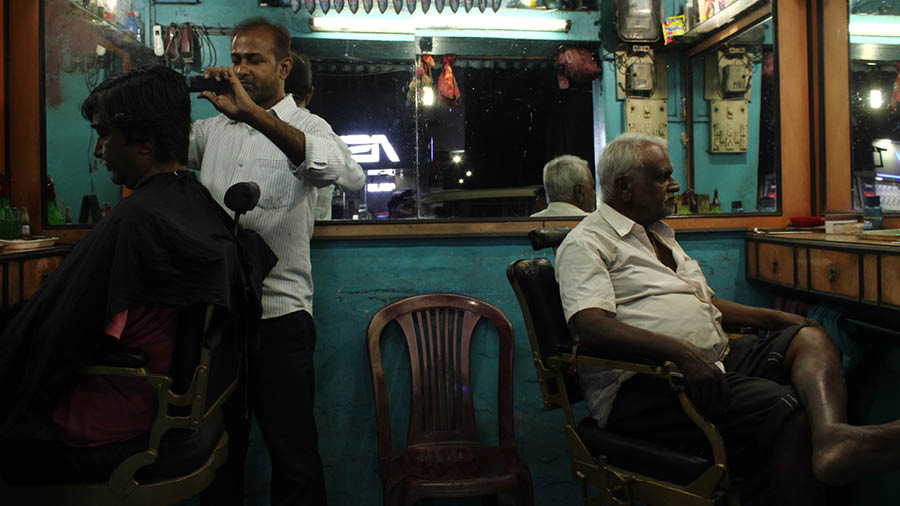
Ramesh and his father, Jawahar Thakur, built a saloon from a roadside chair
The next stop on my down-memory saloon trip was Shankar’s Saloon, a five-minute walk from Jawahar and Ramesh’s setup. It was heartening to see someone waiting to have a trim. Babulaal was managing everything alone. Although it has been a decade since I last came to Shankar’s Saloon, Babulaal remembered me.
“You don’t come to us, any more!” He looked hurt. There was a hint of reproach too, or did I imagine that?
"How’s the pre-Puja business?", I asked.
Babulaal shrugged. “There’s nothing called a special Puja market any more. Maybe the Puja month is a bit better monetarily, but only just. Basically, it’s the same throughout the year.”
Babulaal, who has been working here for twenty years, also feels the lockdown wrecked it all for the saloon. “Suddenly, people didn’t trust us any more. Sanitising, washing everything in warm water wasn’t enough. Somehow, we couldn’t cling on to the little that we had. Covid snatched away everything from us.”
What about the modern salons mushrooming everywhere?
Babulaal smiled. “We lost the race when we didn’t have air-conditioning, fancy trimmers or welcome drinks to offer the new generation.”
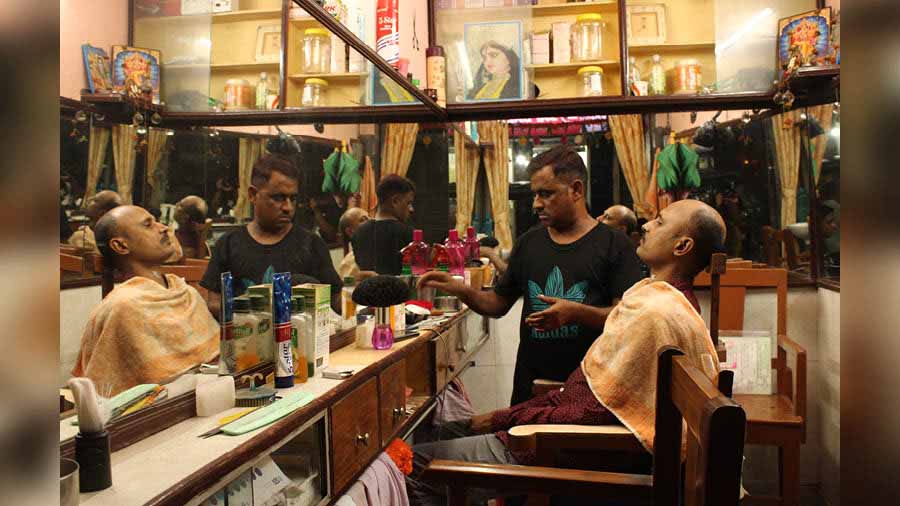
Babulaal has been working at Shankar’s Saloon for two decades
It’s sad but true. Only a few of these old saloons have tried to keep up with the changing times and reinvent themselves to cater to what modern-day customers want. What most of them do, instead, is merely seek comfort in the perfection of their craft, which they say is a diminishing skill. “Obviously, modern kits and equipment will ensure faster work, but the craft of a naapit’s scissors is shaped by years of experience, patience and a sense of perfection which is not easily available,” says Nitai Pramanik, who has been running his saloon for thirty years.
That’s a sentiment Babulaal had shared too when I met him. “Nobody cares about the scissors any more,” he would tell me, as we reminisced about the old days.
But he is not averse to his son, who assists him, getting “better opportunities with established salons”. Nitai also feels that saloons will always retain their cultural individuality. “There are people who still prefer a 50-rupee trim to one that costs Rs 500. Let’s not forget,” he says, “society will always run on our pockets.”
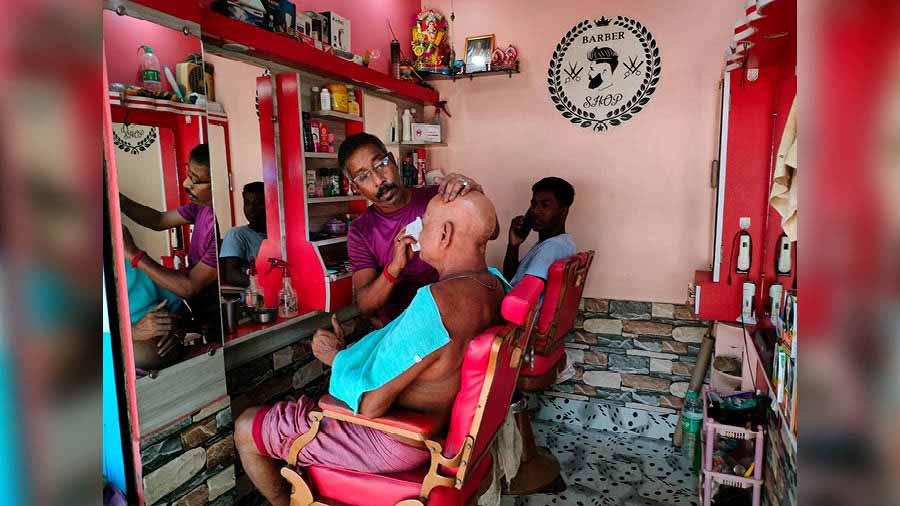
Nitai Pramanik has been running his saloon for thirty years. His son now assists him
I walked out of the cramped lane - catching a whiff of the ever-comforting Old Spice. And there's still something oddly musical about a dead radio on a saloon shelf.


